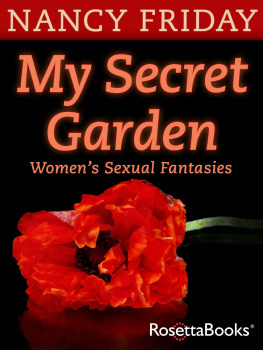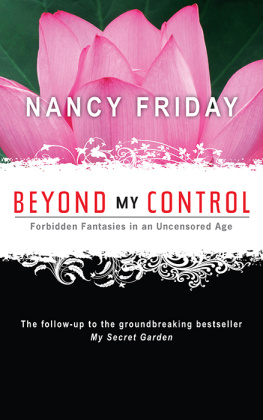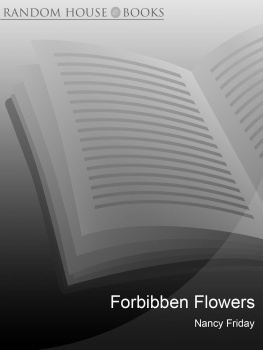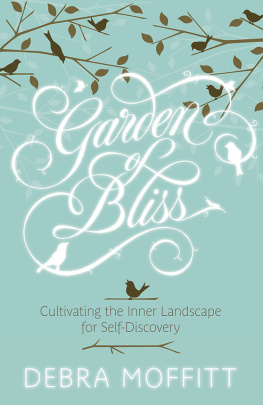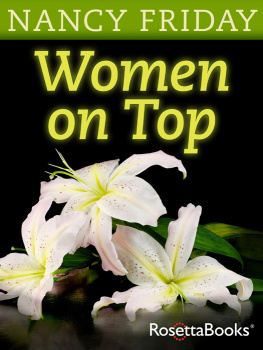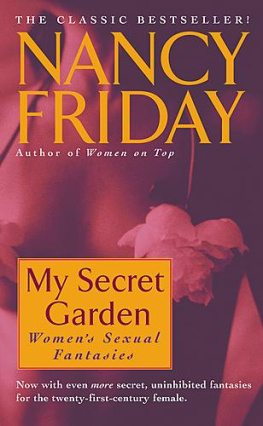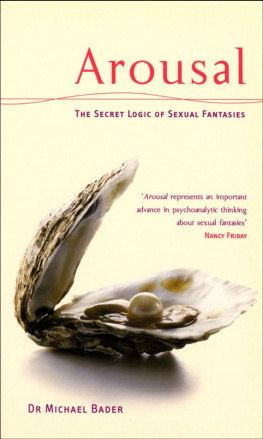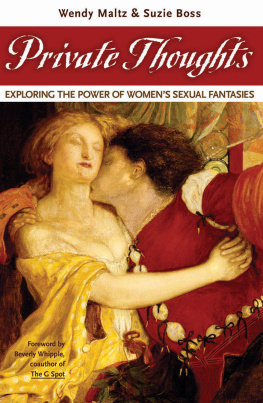All rights reserved. No part of this book may be used or reproduced in any form or by any electronic or mechanical means, including information storage and retrieval systems, without permission in writing from the publisher, except by a reviewer who may quote brief passages in a review.
N.F.
INTRODUCTION
F ORTY Y EARS IN THE G ARDEN
Now, here at the beginning, let me set the record straight. I dont want this to get lost halfway through these introductory pages: Sexual freedom was never a part of modern feminism, never celebrated as such at Feminist Headquarters.
Because so many of us marched in both the Womens Movement and the Sexual Revolution, and because they happened simultaneously, those events remain in memory as one glorious upheaval. Wouldnt it seem irrational to exclude sexual freedom from all the other rightspolitical, social, economicfor which we fought? Why separate sex and state?
I automatically assumed that those of us who marched and wrote in the late 1960s and early 1970s knew there would be no joy in the workplace without sexual freedom, by which I dont mean fucking in the Ladies (Oops!, Womens) Room. Simply put, I knew that we would never be equals staying in the traditional sexual straitjacket. Sex is energy and although it was a fundamental tenet of patriarchy that men held the key to Eros, some of us knew in our bones that women, not men, were and remain the permission givers when it comes to sex. It is through other womens voices that we hear our own. Without fear of their disapproval, all our sexual fuel can run into every facet of our livespolitical, personal, and economic.
Our mistake, however, was believing that everyone on the march had the same agenda. When I sat down to write this book, I thought the feminists would embrace it. I didnt realize that it was unwelcome at Feminist Headquarters until a former friend turned editor at Ms. magazine, gave me a rap on the knuckles, proclaiming that Ms. will decide what womens fantasies are. Soon after, a review in that magazine followed with the opening line this woman is not a feminist.
I was shocked, couldnt believe that I had been called a bad girl for writing about something as joyous as womens sexual liberation. I didnt realize then, as I do now, that the Matriarchal Feminists were consciously determined to leave sex off the agenda. Not that they discussed it. But they knew they couldnt control an army of women pursuing sex with men. Sex between women? That was safe, and still is.
They knew intuitively that other womens voices enable us to hear our own and that keeping men the enemy, up to, and especially, today, allows for a fertile dumping ground for everything that is wrong in womens world.
My initial reaction to the nasty review in Ms. was to forget it. The millions of women who bought My Secret Garden reaffirmed my belief in the importance of understanding sex. Besides, upon completing this book, I had too many questions of my own to pursue. Why, for example, did women, as many do today, feel so guilty about sexual fantasies? We were just thinking, after all, not acting on our thoughts. The answer hit me the day I put down the manuscript for this book: Mother. So I sat down to write an outline, then entitled The First Lie. It subsequently became My Mother/My Self, my study of mothers and daughters. I went on to write five more books, two about womens sexual fantasies, Forbidden Flowers and Women on Top; one on mens sexual fantasies, Men in Love; and Jealousy and The Power of Beauty.
But the Ms. review and all that it implied never went away, and writing my most recent book, on how our looks influence our lives, it returned with full force, an horrific belch from the unconscious. I had come to understand that competition among women was the last taboo, something the Matriarchal Feminists were unwilling to acknowledge or discuss. Better to opt for noncompetitive quilting, as Gloria Steinem proposed in her last book, than accept the reality of competition, for looks, in the workplace and, certainly, for men. No wonder these feminists were and remain so rigid about sex. It wasnt just that they wanted to be taken seriously, as I do, and not as sex objects. It was just as important that they outlaw competition over sex and beauty among women.
That continuing need helps explain its opposite, the enduring popularity of this books erotic themes. These fantasies are perennials that speak to women today as they did twenty-five years ago. A woman masturbating wants to reach orgasm. To do so, she has to win the competition against those who would deprive her of owning her own sex. Who are her competitors? Well, as I learned writing My Mother/My Self, it begins with the Giantess of the Nursery, a loving Giantess as often as not, but one who would not tolerate sexual independence.
No man can cut me as another woman can. Feminisms refusal to address issues of competition leaves us eternally vulnerable to the dangerous power that women hold over one another. All this comes to mind when I think about todays Lesbian Chic, which is in part a celebration of the easy access women have always had to one anothers bodies and in part a natural solution for women conditioned by the Matriarchal Feminists anti-male agenda. A woman lies down with another woman and the world shrugs.
Few women care to live with exclusion from womens world. And so the garden of sexual desire and fulfillment becomes the secret garden, and the sentence I first heard from women twenty-five years ago continues today: Thank God you wrote that book. I thought I was the only one.
How could it be, you might ask, that women today, at the turn of the century, would still think they were the only Bad Girls with erotic thoughts? What kind of prison is this that women impose on themselves? It is, of course, an unconscious pressure, where we seemingly do things against our will. Some part of us chooses the pressure that perfectly fits our need to be taken, to be badyes, ultimately, to reach orgasm.
Need I add that we win in all of our fantasies? Yes, even those involving the so-called rapist, that deus ex machina we roll in to catapult us past a lifetime of womens rules against sex. That fantasy is as popular today as ever. The women whom I have interviewed dont really want to be hurt or humiliated. His male presence, that effective battering ram, neatly makes her relax sufficiently to enjoy orgasm and then allows her to return to earth, her Nice Girl, Good Daughter self intact. The rape fantasy fools them into thinking the loss of control isnt their fault.
What tribute to the power of the unconscious that in the day of the internet, of pornographic videos, not to mention of the erotic assaults on television, that with all this seeming permission, there is still a nay-saying voice that requires answering before we can reach orgasm.
As I have said, Mother isnt an ogress. She is merely human. Love isnt without ambivalence. What we do when we lie down for sex is to reconcile the power of that most important person in our early lives with the power of our own sexual appetites.
Womens lust has always been feared as that extraordinary force that, left unbridled, could bring down not only individuals but also society itself. The bridling comes so early, in mothers milkand, oh, my dears, how fixated the infant remains as she grows to girlhood, watching her, that source of love, warmth, food, life. We never take our eyes off her, and in these earliest preverbal lessons, we learn those lifelong feelings about our bodies.

